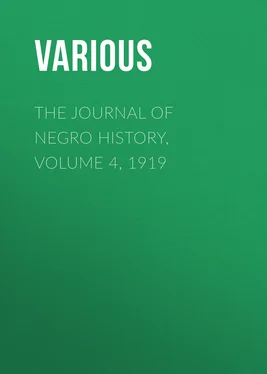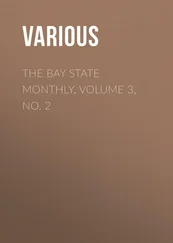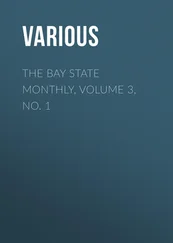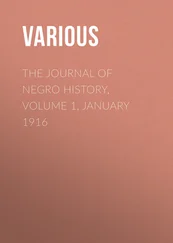Various - The Journal of Negro History, Volume 4, 1919
Здесь есть возможность читать онлайн «Various - The Journal of Negro History, Volume 4, 1919» — ознакомительный отрывок электронной книги совершенно бесплатно, а после прочтения отрывка купить полную версию. В некоторых случаях можно слушать аудио, скачать через торрент в формате fb2 и присутствует краткое содержание. Жанр: foreign_antique, periodic, История, foreign_edu, на английском языке. Описание произведения, (предисловие) а так же отзывы посетителей доступны на портале библиотеки ЛибКат.
- Название:The Journal of Negro History, Volume 4, 1919
- Автор:
- Жанр:
- Год:неизвестен
- ISBN:нет данных
- Рейтинг книги:5 / 5. Голосов: 1
-
Избранное:Добавить в избранное
- Отзывы:
-
Ваша оценка:
- 100
- 1
- 2
- 3
- 4
- 5
The Journal of Negro History, Volume 4, 1919: краткое содержание, описание и аннотация
Предлагаем к чтению аннотацию, описание, краткое содержание или предисловие (зависит от того, что написал сам автор книги «The Journal of Negro History, Volume 4, 1919»). Если вы не нашли необходимую информацию о книге — напишите в комментариях, мы постараемся отыскать её.
The Journal of Negro History, Volume 4, 1919 — читать онлайн ознакомительный отрывок
Ниже представлен текст книги, разбитый по страницам. Система сохранения места последней прочитанной страницы, позволяет с удобством читать онлайн бесплатно книгу «The Journal of Negro History, Volume 4, 1919», без необходимости каждый раз заново искать на чём Вы остановились. Поставьте закладку, и сможете в любой момент перейти на страницу, на которой закончили чтение.
Интервал:
Закладка:
The place the President proposed at this time was a colony in Central America, seven days' run from one of the important Atlantic ports by steamer. He stated that there was great evidence of rich coal mines, excellent harbors, and that the new colony was situated on the highways from the Atlantic or Caribbean to the Pacific Oceans. He told this delegation of men to take their full time in making a reply to him. The delegation withdrew, and we are unable to discover any information regarding the reply. Evidently the group of men never returned to make reply to the appeal of the President. 16 16 Raymond, Life, Public Services and State Papers of Abraham Lincoln , p. 504. Nicolay and Hay, Complete Works of Abraham Lincoln , VIII, p. 1.
In the Second Annual Message December 1, 1862, more practical suggestions were made to Congress by the President. Says he: "Applications have been made to me by many free Americans of African descent to favor their emigration, with a view to such colonization as was contemplated in recent acts of Congress. Other parties at home and abroad—some upon interested motives, others upon patriotic considerations, and still others influenced by philanthropic sentiments have suggested similar measures; while on the other hand several of the Spanish American Republics have protested against the sending of such colonies to their respective territories. Under these circumstances I have declined to move any such colony to any State without first obtaining the consent of the government, with an agreement on its part to receive and protect such emigrants in all the rights of freemen. I have at the same time offered to several States situated within the tropics, or having colonies there to negotiate with them, subject to the advice and consent of the Senate, to favor the voluntary emigration of persons of that class to their respective territories upon conditions which shall be equal, just and humane. Liberia and Hayti are as yet the only countries to which colonies of African descent from here could go with certainty of being received and adopted as citizens; and I regret to say such persons contemplating colonization do not seem so willing to go to those countries as to some others, nor so willing as I think their interest demands. I believe, however, opinion among them in this respect is improving; and that ere long there will be an augmented and considerable migration to both countries from the United States."
Later in the same message Congress is requested to appropriate money and prepare otherwise for colonizing free colored persons with their own consent at some place without the United States. The President continues: "I cannot make it better known than it already is, that I strongly favor colonization and yet I wish to say there is an objection urged against free colored persons remaining in the country, which is largely imaginary, if not sometimes malicious. It is insisted that their presence would injure and displace white labor and white laborers. Is it true then that colored people can displace any more white labor by being free than by remaining slaves? If they stay in their old places they jostle no white laborers; if they leave their old places they leave them open to white laborers. Logically then there is neither more nor less of it. Emancipation even without deportation would probably enhance the wages of white labor and very surely would not reduce them. Reduce the supply of black labor by colonizing the black laborer out of the country and by precisely so much you increase the demand for and wages of white labor." 17 17 Richardson, The Messages and Papers of the President, 1789-1897 , p. 127. Complete Works of Abraham Lincoln , VIII, p. 97. [18] A section of the emancipation proclamation states that it is the President's purpose upon the next meeting of Congress to recommend the adoption of a practical measure so that the effort to "colonize persons of African decent with their consent, upon this continent or elsewhere with the previously obtained consent of the governments existing there," will be continued. Nicolay and Hay, A History , VI, p. 168. [19] It is interesting to note that the colored population seemed very little in favor of colonization. "It is something singular that the colored race—those in reality most interested in the future destinies of Africa—should be so lightly affected by the evidences continually being presented in favor of colonization." The National Intelligencer , October 23, 1850. But an address issued by the National Emigration Convention of Colored people held at Cleveland, Ohio, urged the colored inhabitants of the United States seriously to consider the question of migrating to some foreign clime. See also Journal of Negro History, "Attitude of Free Negro on African Colonization," I.
Pursuant to the power given the President, negotiations were begun with the foreign powers having territory or colonies within the tropics, through the Secretary of State, W. H. Seward, mainly to ascertain if there was any desire on the part of these governments for entering into negotiation on the subject of colonization. Negotiations were to be begun only with those powers which might desire the benefit of such emigration. It was suggested that a ten years' treaty should be signed between the United States and the countries desiring immigration. The latter were required to give specific guarantees for "the perpetual freedom, protection and equal rights of the colonies and their descendants." Before and after the transmission of the proposals to foreign countries, propositions came from the Danish Island of St. Croix in the West Indies, the Netherland Colony of St. Swinam, the British Colony of Guiana, the British Colony of Honduras, the Republic of Hayti, the Republic of Liberia, New Granada and Ecuador. The Republics of Central America, Guatemala, Salvador, Costa Rica, and Nicaragua, objected to such emigration as undesirable. 18 18 Diplomatic Correspondence , Part I, p. 202. Nicolay and Hay. Complete Works , p. 357.
Great Britain rejected the proposal as a governmental proposition on the ground that it might involve the government in some difficulty with the United States government because of fugitives, and therefore expressed her disagreement with such a convention. Seward had asserted that there was no objection to voluntary emigration; the government of British Honduras and Guiana then appointed immigration agents who were to promote the immigration of laborers by using Boston, New York and Philadelphia as emigration ports.
The President came to be of the firm opinion that emigration must be voluntary and without expense to those who went. This was repeatedly asserted according to reports of the Cabinet meeting by Gideon Wells. 19 19 "Mr. Bates was for compulsory deportation. The Negro would not," he said, "go voluntary." "He had great local attachment but no enterprise or persistency. The President objected unequivocally to compulsion. The emigration must be voluntary and without expense to themselves. Great Britain, Denmark and perhaps other powers would take them. I remarked there was no necessity for a treaty which had been suggested. Any person who desired to leave the country could do so now, whether white or black, and it was best to have it so—a voluntary system; the emigrant who chose to leave our shores could and would go where there were the best inducements." Diary of Gideon Wells , I, p. 152.
The Netherlands sought to secure a labor supply for the colony of Swinan for a term of years, using the freedmen as hired laborers. Seward objected to the acceptance of such a proposal.
Of all the propositions offered President Lincoln seemed satisfied with two—one was for the establishment of a colony in the harbor of Chiriqui in the northeastern section of the State of Panama, 20 20 Cf. Account by Charles K. Tuckerman, Magazine of American History , October, 1886.
near the republics of New Granada and Costa Rica. The situation seemed favorable not only because of the ordinary advantages of soil and climate but also because of its proximity to a proposed canal across the Isthmus of Darien and because of its reputedly rich coal fields. There were two objections to this plan. One was the existence of a dispute over territory between the republics of Costa Rica and Granada. The other grew out of a specific examination of the coal fields by Professor Henry of the Smithsonian Institute. 21 21 Joseph Henry said to Assistant Secretary of State, September 5, 1862: "I hope the government will not make any contracts in regard to the purchase of the Chiriqui District until it has been thoroughly examined by persons of known capacity and integrity. A critical examination of all that has been reported on the existence of valuable beds of coal in that region has failed to convince me of the fact." Chiriqui is described in report Number 148, House of Representatives, 37th Congress, Second Session, July 16, 1862, by John Evans, geologist.
His report doubted the value of the coal bed and advised a more thorough examination before closing the purchase. Before the project could be examined a more acceptable proposition appeared. In addition it also developed that there was opposition to Negro emigration from several of the States of Central America. 22 22 "There was an indisposition to press the subject of Negro Emigration to Chiriqui at the meeting of the Cabinet against the wishes and remonstrances of the states of Central America." Diary of Gideon Wells , I, p. 162.
Интервал:
Закладка:
Похожие книги на «The Journal of Negro History, Volume 4, 1919»
Представляем Вашему вниманию похожие книги на «The Journal of Negro History, Volume 4, 1919» списком для выбора. Мы отобрали схожую по названию и смыслу литературу в надежде предоставить читателям больше вариантов отыскать новые, интересные, ещё непрочитанные произведения.
Обсуждение, отзывы о книге «The Journal of Negro History, Volume 4, 1919» и просто собственные мнения читателей. Оставьте ваши комментарии, напишите, что Вы думаете о произведении, его смысле или главных героях. Укажите что конкретно понравилось, а что нет, и почему Вы так считаете.












